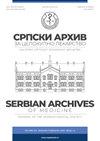小/单胃吻合术治疗肥胖抑郁症1例
IF 0.2
4区 医学
Q4 MEDICINE, GENERAL & INTERNAL
引用次数: 0
摘要
介绍。在准备进行代谢手术的患者中,精神疾病的患病率很高,尤其是抑郁症。Mini/one吻合胃旁路术(MGB/OAGB)是一种减肥手术,有可能完全恢复消化道或“量身定制”。如果病人体重恢复,就会有胆胰截肢。我们报告了一位肥胖的抑郁症患者,他在塞尔维亚接受了第一次MGB/OAGB,随访期为一年。大纲。1例体重144 kg,体重指数(BMI) 46.8 kg/m2,伴有抑郁症的肥胖患者,行MGB/OAGB,随访1年。手术是在发明人在场的情况下使用该技术进行的,手术恢复顺利。患者完全停止接受精神治疗,或任何其他治疗,没有依从性,并完全社会恢复。在随访期后,他减掉了49公斤,BMI = 30。9公斤/米?超重减重率(%EWL)为73.1%。结论。对于精神肥胖患者,应仔细选择代谢程序。MGB/OAGB在我们的患者身上被证明是一个成功的减肥手术,导致抑郁症的缓解和精神治疗的停止,而且在手术后一年的时间里体重也有了显著的下降。本文章由计算机程序翻译,如有差异,请以英文原文为准。
Mini/one anastomosis gastric bypass in an obese depressive patient
Introduction. There is a high prevalence of psychiatric disorders in patients who are preparing for metabolic operation especially depression. Mini/one anastomosis gastric bypass (MGB/OAGB) is a bariatric operation with the possibility of complete restoration of the digestive tract or ?tailoring? of a biliopancreatic limb if the patient's weight regains. We present an obese patient with depression who underwent the first MGB/OAGB in Serbia with a follow-up period of one year. Case outline. An obese patient with a body weight of 144 kilograms and a body mass index (BMI) of 46.8 kg/m2 and depression as an accompanying comorbidity, underwent MGB/OAGB with a follow-up period of one year. The operation was performed using the inventor's technique in his presence and the recovery was uneventful. The patient completely stops taking psychiatric therapy, or any other, with no compliance and has completely social restitution. After the follow-up period, he loses 49 kg, actually BMI = 30. 9 kg/m? and the percentage of excess weight loss (%EWL) is 73.1 %. Conclusion. In psychiatric obese patients, a metabolic procedure should be carefully selected. MGB/OAGB proved to be a successful bariatric procedure in our patient, leading to remission of depression and discontinuation of psychiatric therapy, but also to a significant reduction in body weight in the period of one year after surgery.
求助全文
通过发布文献求助,成功后即可免费获取论文全文。
去求助
来源期刊

Srpski arhiv za celokupno lekarstvo
MEDICINE, GENERAL & INTERNAL-
CiteScore
0.40
自引率
50.00%
发文量
104
审稿时长
4-8 weeks
期刊介绍:
Srpski Arhiv Za Celokupno Lekarstvo (Serbian Archives of Medicine) is the Journal of the Serbian Medical Society, founded in 1872, which publishes articles by the members of the Serbian Medical Society, subscribers, as well as members of other associations of medical and related fields. The Journal publishes: original articles, communications, case reports, review articles, current topics, articles of history of medicine, articles for practitioners, articles related to the language of medicine, articles on medical ethics (clinical ethics, publication ethics, regulatory standards in medicine), congress and scientific meeting reports, professional news, book reviews, texts for "In memory of...", i.e. In memoriam and Promemoria columns, as well as comments and letters to the Editorial Board.
All manuscripts under consideration in the Serbian Archives of Medicine may not be offered or be under consideration for publication elsewhere. Articles must not have been published elsewhere (in part or in full).
 求助内容:
求助内容: 应助结果提醒方式:
应助结果提醒方式:


